Australian Taxation Law: Case Study on Income Tax Assessment Act 1997
VerifiedAdded on 2023/06/03
|7
|2008
|302
Case Study
AI Summary
This case study examines Australian taxation law, specifically focusing on the Income Tax Assessment Act 1997 and its application to employment income. It analyzes a scenario where an employee disputes their tax return, arguing that certain expenses should not be deductible because they relate to a period before income was earned. The analysis delves into the provisions of the Income Tax Assessment Act 1997, particularly sections related to general and specific deductions, and assesses the eligibility of the employee's claimed deductions based on whether the expenses were work-related and incurred during the financial year. The study concludes that the employee's argument, based on a matching concept, is not supported by the Act, as the legislation focuses on expenses incurred during the financial year, regardless of when income is generated, provided the expenses are directly related to earning that income.
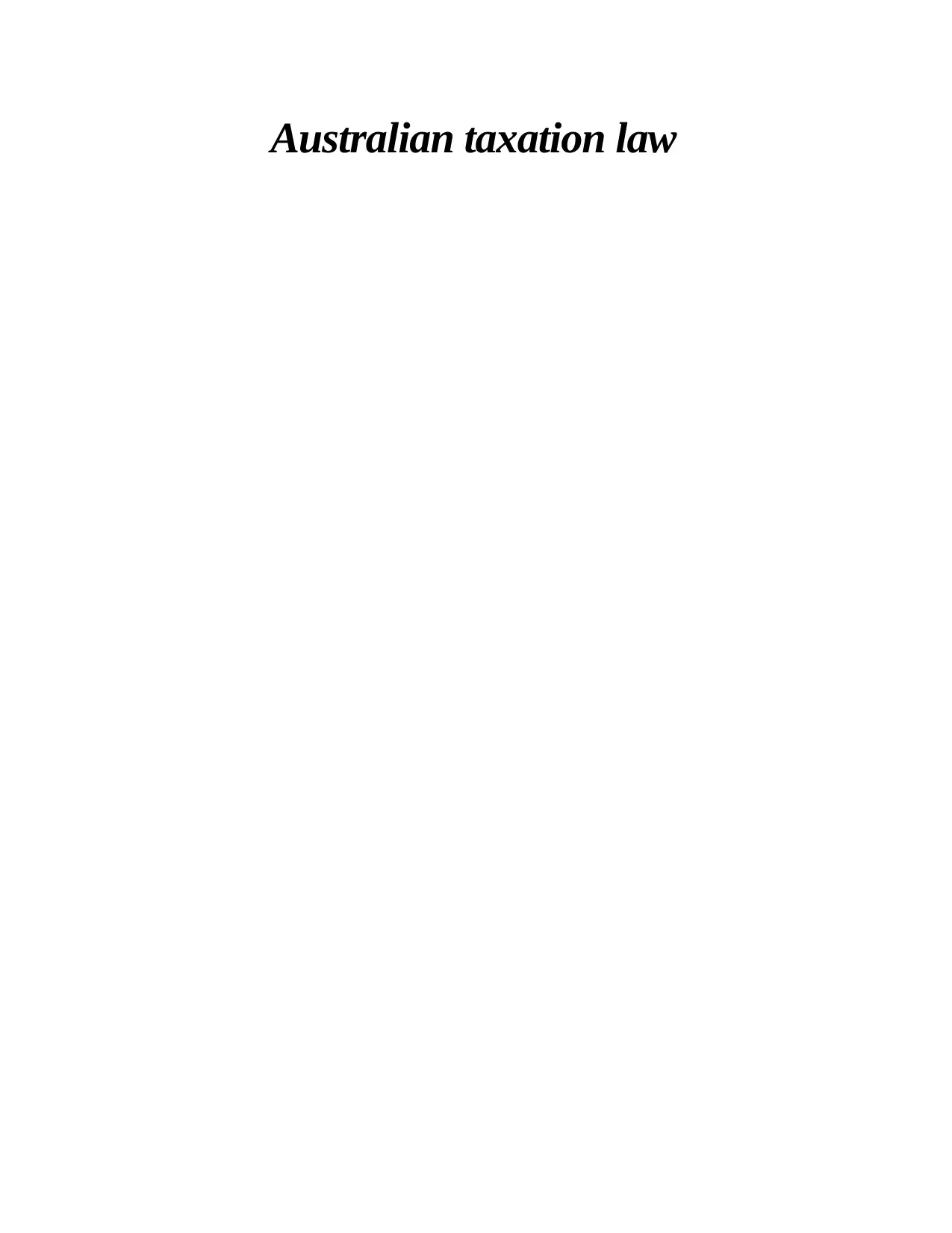
Australian taxation law
Paraphrase This Document
Need a fresh take? Get an instant paraphrase of this document with our AI Paraphraser
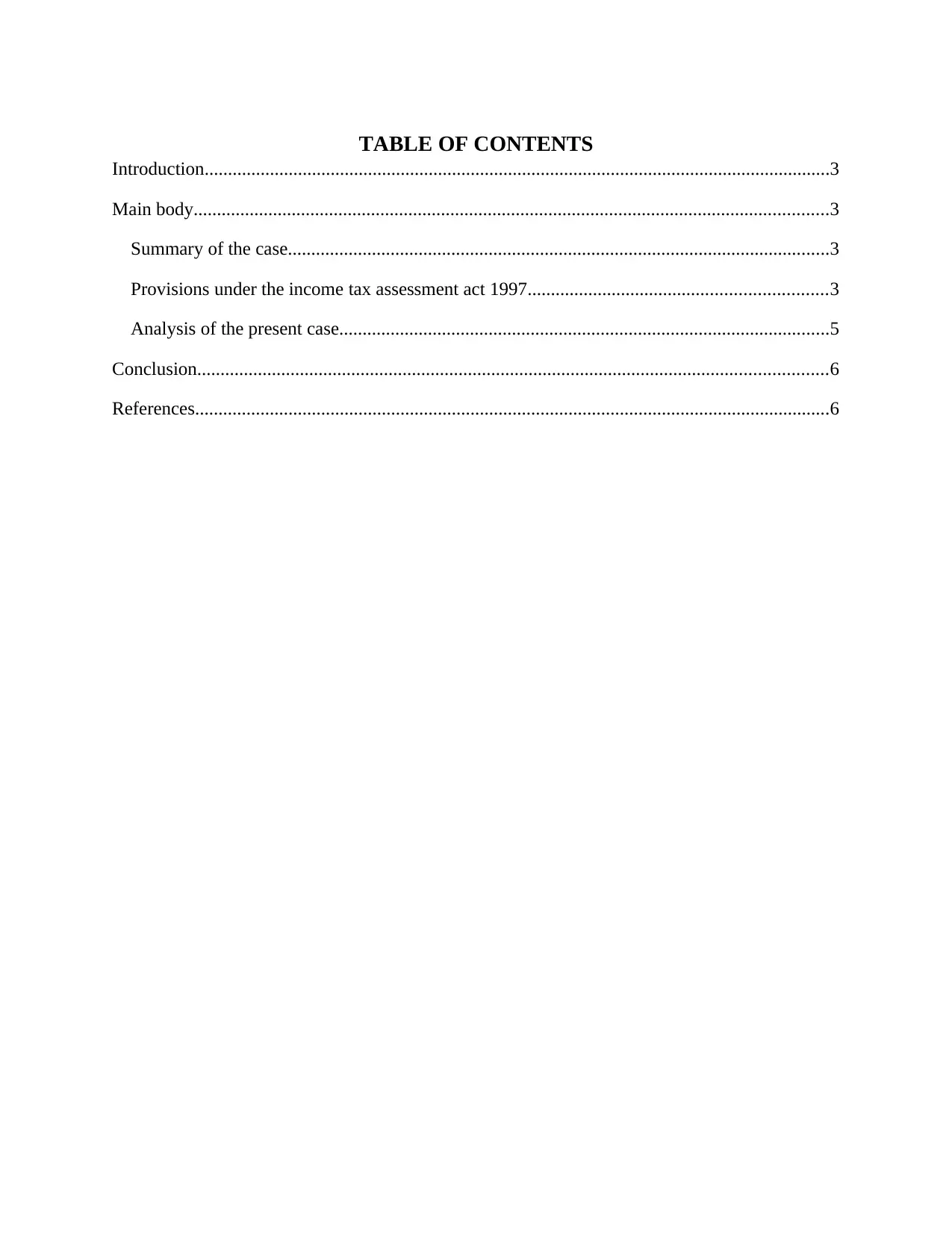
TABLE OF CONTENTS
Introduction......................................................................................................................................3
Main body........................................................................................................................................3
Summary of the case....................................................................................................................3
Provisions under the income tax assessment act 1997................................................................3
Analysis of the present case.........................................................................................................5
Conclusion.......................................................................................................................................6
References........................................................................................................................................6
Introduction......................................................................................................................................3
Main body........................................................................................................................................3
Summary of the case....................................................................................................................3
Provisions under the income tax assessment act 1997................................................................3
Analysis of the present case.........................................................................................................5
Conclusion.......................................................................................................................................6
References........................................................................................................................................6
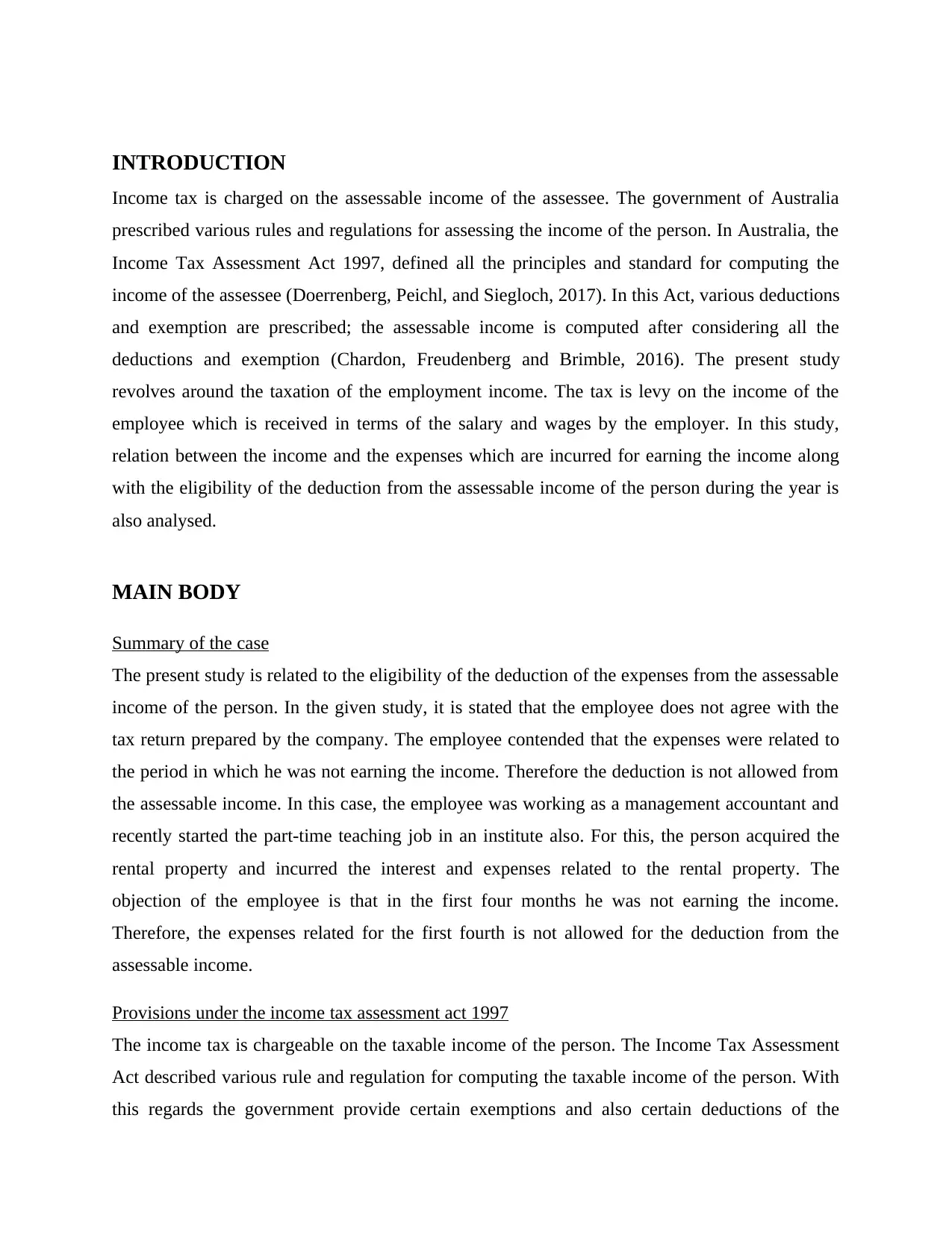
INTRODUCTION
Income tax is charged on the assessable income of the assessee. The government of Australia
prescribed various rules and regulations for assessing the income of the person. In Australia, the
Income Tax Assessment Act 1997, defined all the principles and standard for computing the
income of the assessee (Doerrenberg, Peichl, and Siegloch, 2017). In this Act, various deductions
and exemption are prescribed; the assessable income is computed after considering all the
deductions and exemption (Chardon, Freudenberg and Brimble, 2016). The present study
revolves around the taxation of the employment income. The tax is levy on the income of the
employee which is received in terms of the salary and wages by the employer. In this study,
relation between the income and the expenses which are incurred for earning the income along
with the eligibility of the deduction from the assessable income of the person during the year is
also analysed.
MAIN BODY
Summary of the case
The present study is related to the eligibility of the deduction of the expenses from the assessable
income of the person. In the given study, it is stated that the employee does not agree with the
tax return prepared by the company. The employee contended that the expenses were related to
the period in which he was not earning the income. Therefore the deduction is not allowed from
the assessable income. In this case, the employee was working as a management accountant and
recently started the part-time teaching job in an institute also. For this, the person acquired the
rental property and incurred the interest and expenses related to the rental property. The
objection of the employee is that in the first four months he was not earning the income.
Therefore, the expenses related for the first fourth is not allowed for the deduction from the
assessable income.
Provisions under the income tax assessment act 1997
The income tax is chargeable on the taxable income of the person. The Income Tax Assessment
Act described various rule and regulation for computing the taxable income of the person. With
this regards the government provide certain exemptions and also certain deductions of the
Income tax is charged on the assessable income of the assessee. The government of Australia
prescribed various rules and regulations for assessing the income of the person. In Australia, the
Income Tax Assessment Act 1997, defined all the principles and standard for computing the
income of the assessee (Doerrenberg, Peichl, and Siegloch, 2017). In this Act, various deductions
and exemption are prescribed; the assessable income is computed after considering all the
deductions and exemption (Chardon, Freudenberg and Brimble, 2016). The present study
revolves around the taxation of the employment income. The tax is levy on the income of the
employee which is received in terms of the salary and wages by the employer. In this study,
relation between the income and the expenses which are incurred for earning the income along
with the eligibility of the deduction from the assessable income of the person during the year is
also analysed.
MAIN BODY
Summary of the case
The present study is related to the eligibility of the deduction of the expenses from the assessable
income of the person. In the given study, it is stated that the employee does not agree with the
tax return prepared by the company. The employee contended that the expenses were related to
the period in which he was not earning the income. Therefore the deduction is not allowed from
the assessable income. In this case, the employee was working as a management accountant and
recently started the part-time teaching job in an institute also. For this, the person acquired the
rental property and incurred the interest and expenses related to the rental property. The
objection of the employee is that in the first four months he was not earning the income.
Therefore, the expenses related for the first fourth is not allowed for the deduction from the
assessable income.
Provisions under the income tax assessment act 1997
The income tax is chargeable on the taxable income of the person. The Income Tax Assessment
Act described various rule and regulation for computing the taxable income of the person. With
this regards the government provide certain exemptions and also certain deductions of the
⊘ This is a preview!⊘
Do you want full access?
Subscribe today to unlock all pages.

Trusted by 1+ million students worldwide
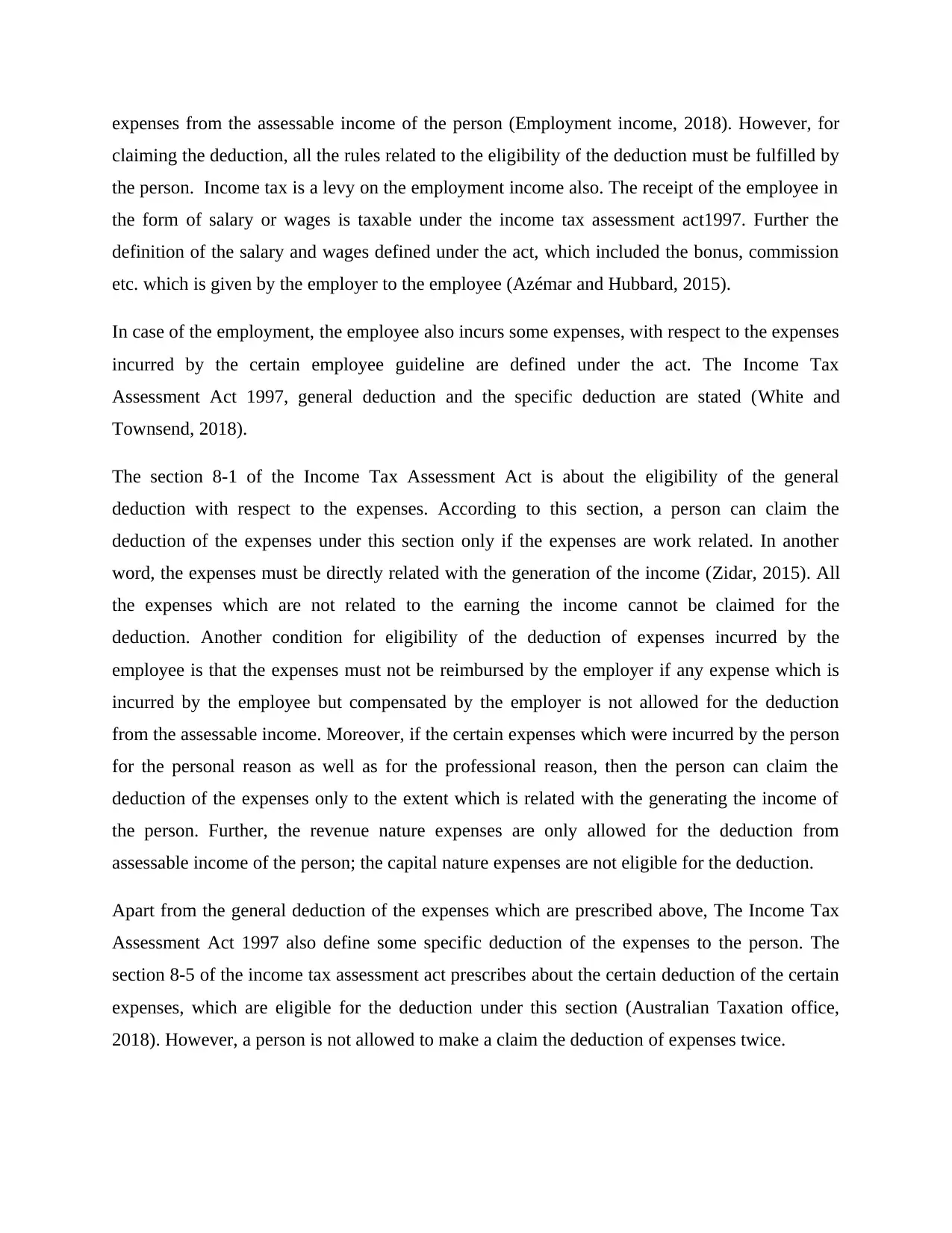
expenses from the assessable income of the person (Employment income, 2018). However, for
claiming the deduction, all the rules related to the eligibility of the deduction must be fulfilled by
the person. Income tax is a levy on the employment income also. The receipt of the employee in
the form of salary or wages is taxable under the income tax assessment act1997. Further the
definition of the salary and wages defined under the act, which included the bonus, commission
etc. which is given by the employer to the employee (Azémar and Hubbard, 2015).
In case of the employment, the employee also incurs some expenses, with respect to the expenses
incurred by the certain employee guideline are defined under the act. The Income Tax
Assessment Act 1997, general deduction and the specific deduction are stated (White and
Townsend, 2018).
The section 8-1 of the Income Tax Assessment Act is about the eligibility of the general
deduction with respect to the expenses. According to this section, a person can claim the
deduction of the expenses under this section only if the expenses are work related. In another
word, the expenses must be directly related with the generation of the income (Zidar, 2015). All
the expenses which are not related to the earning the income cannot be claimed for the
deduction. Another condition for eligibility of the deduction of expenses incurred by the
employee is that the expenses must not be reimbursed by the employer if any expense which is
incurred by the employee but compensated by the employer is not allowed for the deduction
from the assessable income. Moreover, if the certain expenses which were incurred by the person
for the personal reason as well as for the professional reason, then the person can claim the
deduction of the expenses only to the extent which is related with the generating the income of
the person. Further, the revenue nature expenses are only allowed for the deduction from
assessable income of the person; the capital nature expenses are not eligible for the deduction.
Apart from the general deduction of the expenses which are prescribed above, The Income Tax
Assessment Act 1997 also define some specific deduction of the expenses to the person. The
section 8-5 of the income tax assessment act prescribes about the certain deduction of the certain
expenses, which are eligible for the deduction under this section (Australian Taxation office,
2018). However, a person is not allowed to make a claim the deduction of expenses twice.
claiming the deduction, all the rules related to the eligibility of the deduction must be fulfilled by
the person. Income tax is a levy on the employment income also. The receipt of the employee in
the form of salary or wages is taxable under the income tax assessment act1997. Further the
definition of the salary and wages defined under the act, which included the bonus, commission
etc. which is given by the employer to the employee (Azémar and Hubbard, 2015).
In case of the employment, the employee also incurs some expenses, with respect to the expenses
incurred by the certain employee guideline are defined under the act. The Income Tax
Assessment Act 1997, general deduction and the specific deduction are stated (White and
Townsend, 2018).
The section 8-1 of the Income Tax Assessment Act is about the eligibility of the general
deduction with respect to the expenses. According to this section, a person can claim the
deduction of the expenses under this section only if the expenses are work related. In another
word, the expenses must be directly related with the generation of the income (Zidar, 2015). All
the expenses which are not related to the earning the income cannot be claimed for the
deduction. Another condition for eligibility of the deduction of expenses incurred by the
employee is that the expenses must not be reimbursed by the employer if any expense which is
incurred by the employee but compensated by the employer is not allowed for the deduction
from the assessable income. Moreover, if the certain expenses which were incurred by the person
for the personal reason as well as for the professional reason, then the person can claim the
deduction of the expenses only to the extent which is related with the generating the income of
the person. Further, the revenue nature expenses are only allowed for the deduction from
assessable income of the person; the capital nature expenses are not eligible for the deduction.
Apart from the general deduction of the expenses which are prescribed above, The Income Tax
Assessment Act 1997 also define some specific deduction of the expenses to the person. The
section 8-5 of the income tax assessment act prescribes about the certain deduction of the certain
expenses, which are eligible for the deduction under this section (Australian Taxation office,
2018). However, a person is not allowed to make a claim the deduction of expenses twice.
Paraphrase This Document
Need a fresh take? Get an instant paraphrase of this document with our AI Paraphraser
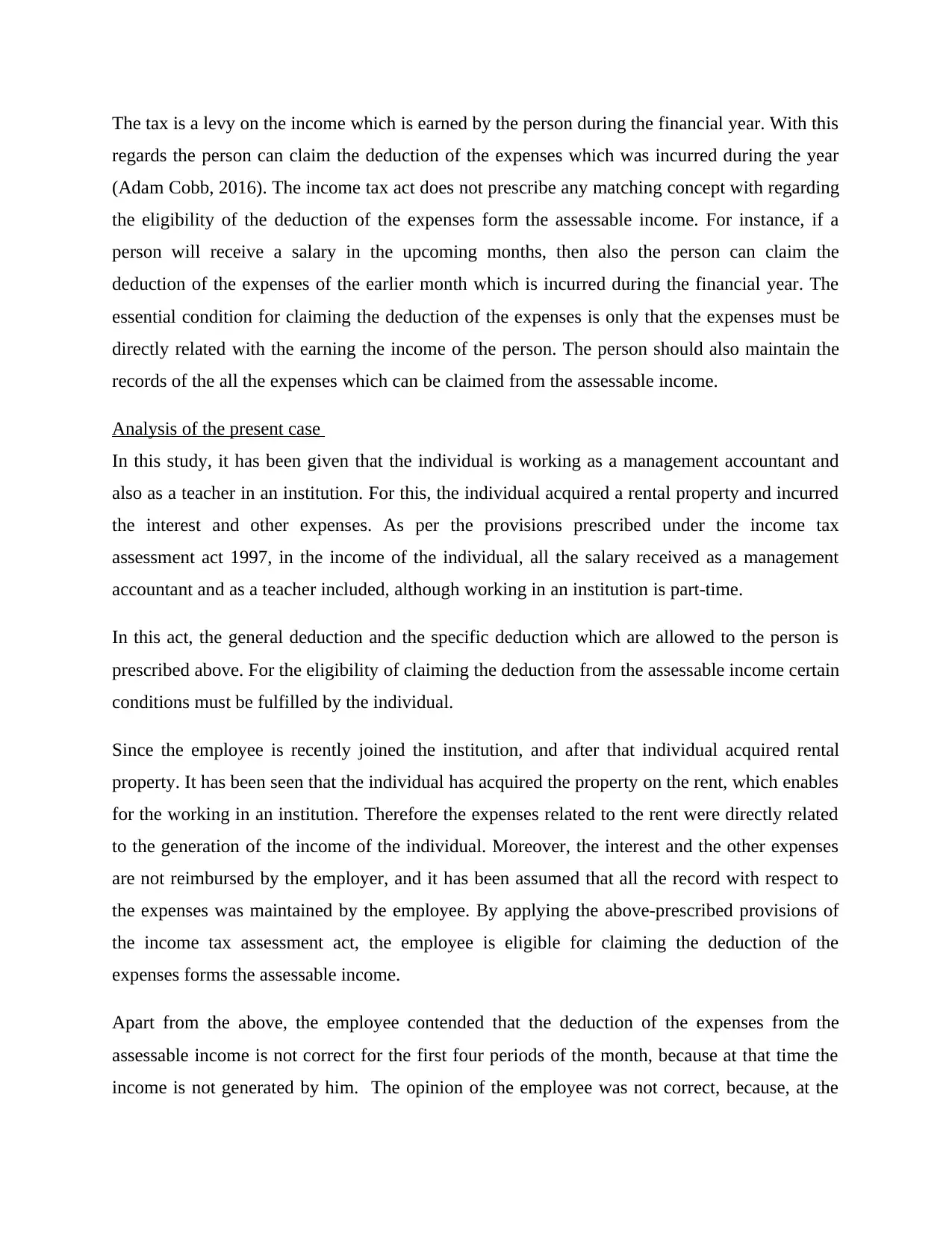
The tax is a levy on the income which is earned by the person during the financial year. With this
regards the person can claim the deduction of the expenses which was incurred during the year
(Adam Cobb, 2016). The income tax act does not prescribe any matching concept with regarding
the eligibility of the deduction of the expenses form the assessable income. For instance, if a
person will receive a salary in the upcoming months, then also the person can claim the
deduction of the expenses of the earlier month which is incurred during the financial year. The
essential condition for claiming the deduction of the expenses is only that the expenses must be
directly related with the earning the income of the person. The person should also maintain the
records of the all the expenses which can be claimed from the assessable income.
Analysis of the present case
In this study, it has been given that the individual is working as a management accountant and
also as a teacher in an institution. For this, the individual acquired a rental property and incurred
the interest and other expenses. As per the provisions prescribed under the income tax
assessment act 1997, in the income of the individual, all the salary received as a management
accountant and as a teacher included, although working in an institution is part-time.
In this act, the general deduction and the specific deduction which are allowed to the person is
prescribed above. For the eligibility of claiming the deduction from the assessable income certain
conditions must be fulfilled by the individual.
Since the employee is recently joined the institution, and after that individual acquired rental
property. It has been seen that the individual has acquired the property on the rent, which enables
for the working in an institution. Therefore the expenses related to the rent were directly related
to the generation of the income of the individual. Moreover, the interest and the other expenses
are not reimbursed by the employer, and it has been assumed that all the record with respect to
the expenses was maintained by the employee. By applying the above-prescribed provisions of
the income tax assessment act, the employee is eligible for claiming the deduction of the
expenses forms the assessable income.
Apart from the above, the employee contended that the deduction of the expenses from the
assessable income is not correct for the first four periods of the month, because at that time the
income is not generated by him. The opinion of the employee was not correct, because, at the
regards the person can claim the deduction of the expenses which was incurred during the year
(Adam Cobb, 2016). The income tax act does not prescribe any matching concept with regarding
the eligibility of the deduction of the expenses form the assessable income. For instance, if a
person will receive a salary in the upcoming months, then also the person can claim the
deduction of the expenses of the earlier month which is incurred during the financial year. The
essential condition for claiming the deduction of the expenses is only that the expenses must be
directly related with the earning the income of the person. The person should also maintain the
records of the all the expenses which can be claimed from the assessable income.
Analysis of the present case
In this study, it has been given that the individual is working as a management accountant and
also as a teacher in an institution. For this, the individual acquired a rental property and incurred
the interest and other expenses. As per the provisions prescribed under the income tax
assessment act 1997, in the income of the individual, all the salary received as a management
accountant and as a teacher included, although working in an institution is part-time.
In this act, the general deduction and the specific deduction which are allowed to the person is
prescribed above. For the eligibility of claiming the deduction from the assessable income certain
conditions must be fulfilled by the individual.
Since the employee is recently joined the institution, and after that individual acquired rental
property. It has been seen that the individual has acquired the property on the rent, which enables
for the working in an institution. Therefore the expenses related to the rent were directly related
to the generation of the income of the individual. Moreover, the interest and the other expenses
are not reimbursed by the employer, and it has been assumed that all the record with respect to
the expenses was maintained by the employee. By applying the above-prescribed provisions of
the income tax assessment act, the employee is eligible for claiming the deduction of the
expenses forms the assessable income.
Apart from the above, the employee contended that the deduction of the expenses from the
assessable income is not correct for the first four periods of the month, because at that time the
income is not generated by him. The opinion of the employee was not correct, because, at the
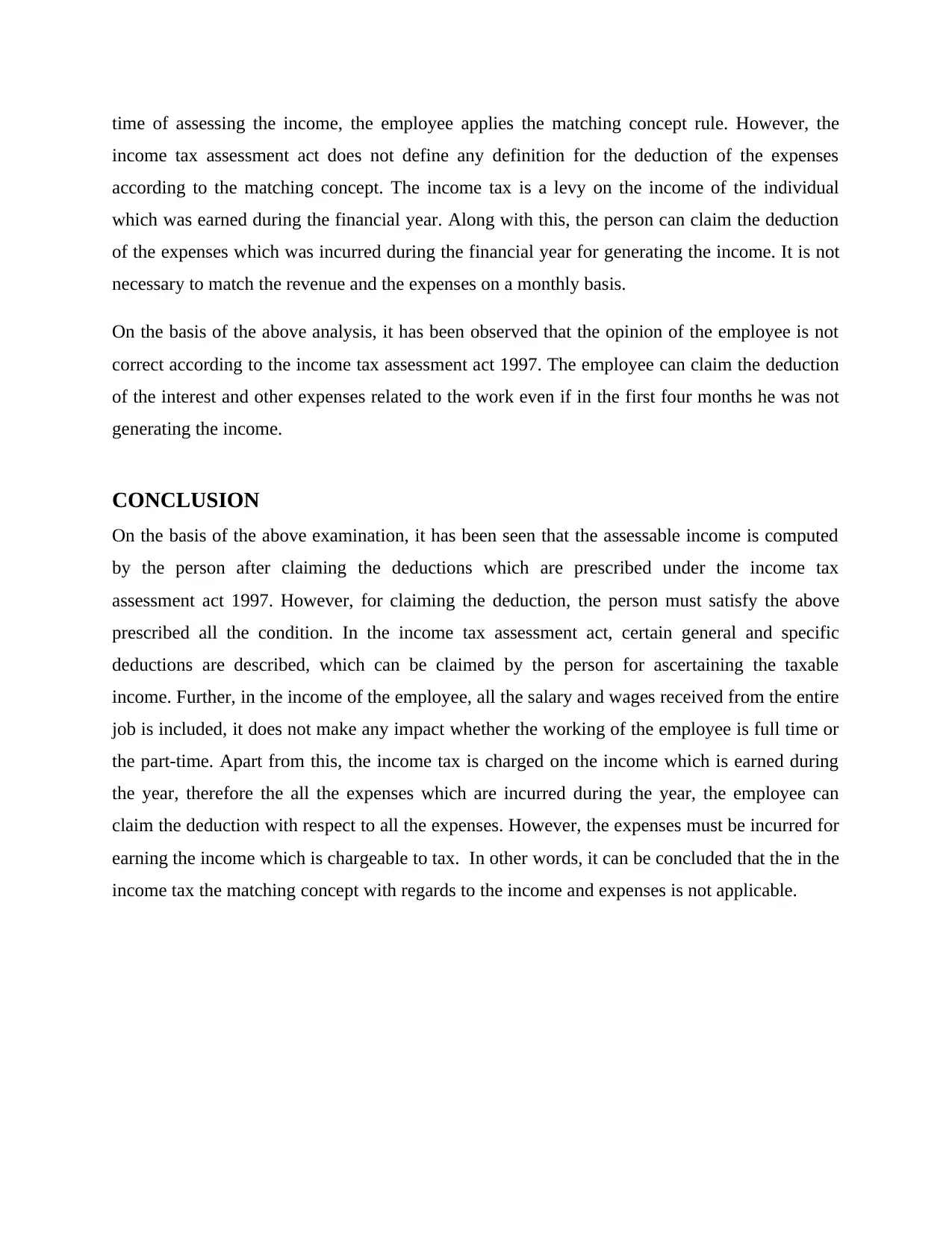
time of assessing the income, the employee applies the matching concept rule. However, the
income tax assessment act does not define any definition for the deduction of the expenses
according to the matching concept. The income tax is a levy on the income of the individual
which was earned during the financial year. Along with this, the person can claim the deduction
of the expenses which was incurred during the financial year for generating the income. It is not
necessary to match the revenue and the expenses on a monthly basis.
On the basis of the above analysis, it has been observed that the opinion of the employee is not
correct according to the income tax assessment act 1997. The employee can claim the deduction
of the interest and other expenses related to the work even if in the first four months he was not
generating the income.
CONCLUSION
On the basis of the above examination, it has been seen that the assessable income is computed
by the person after claiming the deductions which are prescribed under the income tax
assessment act 1997. However, for claiming the deduction, the person must satisfy the above
prescribed all the condition. In the income tax assessment act, certain general and specific
deductions are described, which can be claimed by the person for ascertaining the taxable
income. Further, in the income of the employee, all the salary and wages received from the entire
job is included, it does not make any impact whether the working of the employee is full time or
the part-time. Apart from this, the income tax is charged on the income which is earned during
the year, therefore the all the expenses which are incurred during the year, the employee can
claim the deduction with respect to all the expenses. However, the expenses must be incurred for
earning the income which is chargeable to tax. In other words, it can be concluded that the in the
income tax the matching concept with regards to the income and expenses is not applicable.
income tax assessment act does not define any definition for the deduction of the expenses
according to the matching concept. The income tax is a levy on the income of the individual
which was earned during the financial year. Along with this, the person can claim the deduction
of the expenses which was incurred during the financial year for generating the income. It is not
necessary to match the revenue and the expenses on a monthly basis.
On the basis of the above analysis, it has been observed that the opinion of the employee is not
correct according to the income tax assessment act 1997. The employee can claim the deduction
of the interest and other expenses related to the work even if in the first four months he was not
generating the income.
CONCLUSION
On the basis of the above examination, it has been seen that the assessable income is computed
by the person after claiming the deductions which are prescribed under the income tax
assessment act 1997. However, for claiming the deduction, the person must satisfy the above
prescribed all the condition. In the income tax assessment act, certain general and specific
deductions are described, which can be claimed by the person for ascertaining the taxable
income. Further, in the income of the employee, all the salary and wages received from the entire
job is included, it does not make any impact whether the working of the employee is full time or
the part-time. Apart from this, the income tax is charged on the income which is earned during
the year, therefore the all the expenses which are incurred during the year, the employee can
claim the deduction with respect to all the expenses. However, the expenses must be incurred for
earning the income which is chargeable to tax. In other words, it can be concluded that the in the
income tax the matching concept with regards to the income and expenses is not applicable.
⊘ This is a preview!⊘
Do you want full access?
Subscribe today to unlock all pages.

Trusted by 1+ million students worldwide
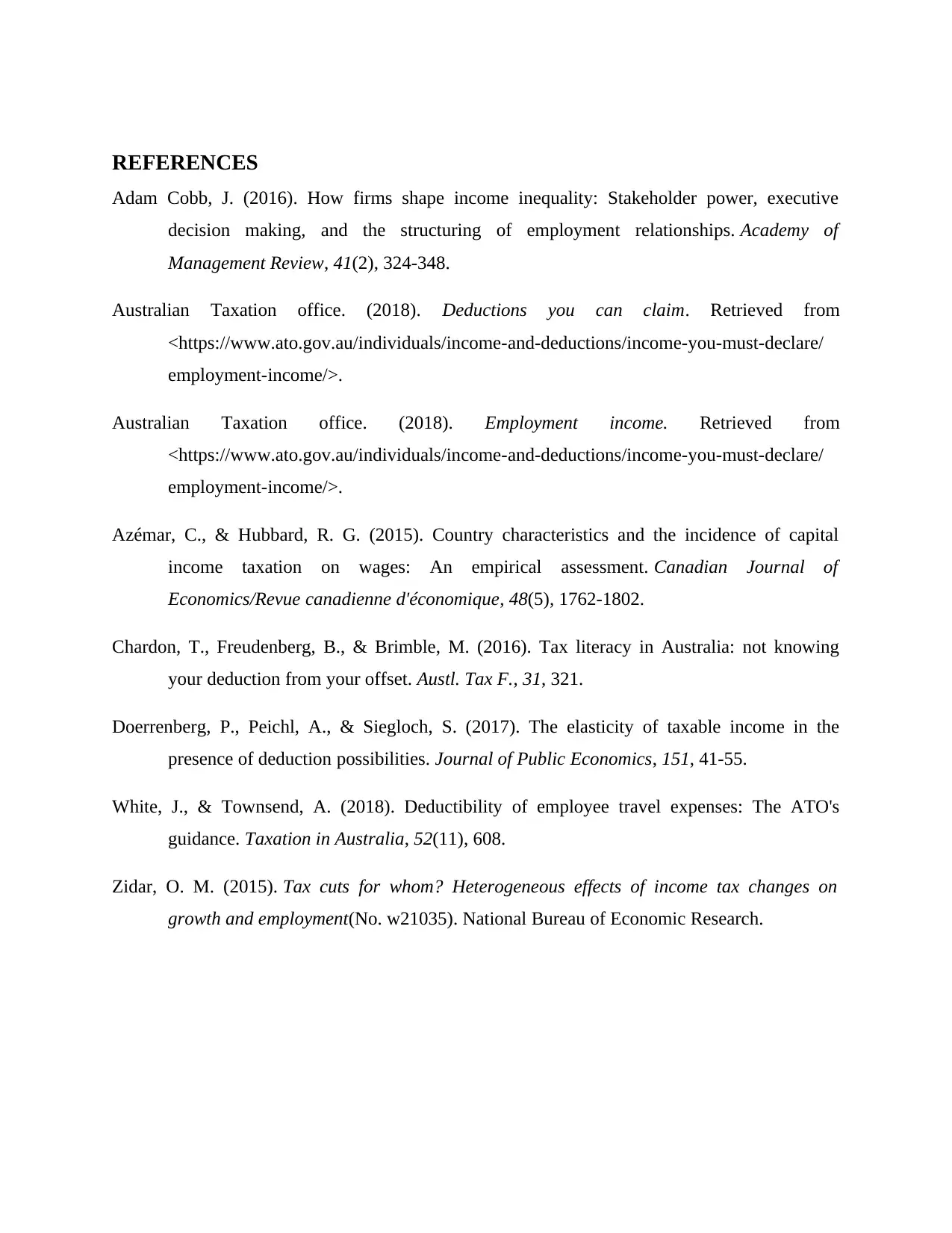
REFERENCES
Adam Cobb, J. (2016). How firms shape income inequality: Stakeholder power, executive
decision making, and the structuring of employment relationships. Academy of
Management Review, 41(2), 324-348.
Australian Taxation office. (2018). Deductions you can claim. Retrieved from
<https://www.ato.gov.au/individuals/income-and-deductions/income-you-must-declare/
employment-income/>.
Australian Taxation office. (2018). Employment income. Retrieved from
<https://www.ato.gov.au/individuals/income-and-deductions/income-you-must-declare/
employment-income/>.
Azémar, C., & Hubbard, R. G. (2015). Country characteristics and the incidence of capital
income taxation on wages: An empirical assessment. Canadian Journal of
Economics/Revue canadienne d'économique, 48(5), 1762-1802.
Chardon, T., Freudenberg, B., & Brimble, M. (2016). Tax literacy in Australia: not knowing
your deduction from your offset. Austl. Tax F., 31, 321.
Doerrenberg, P., Peichl, A., & Siegloch, S. (2017). The elasticity of taxable income in the
presence of deduction possibilities. Journal of Public Economics, 151, 41-55.
White, J., & Townsend, A. (2018). Deductibility of employee travel expenses: The ATO's
guidance. Taxation in Australia, 52(11), 608.
Zidar, O. M. (2015). Tax cuts for whom? Heterogeneous effects of income tax changes on
growth and employment(No. w21035). National Bureau of Economic Research.
Adam Cobb, J. (2016). How firms shape income inequality: Stakeholder power, executive
decision making, and the structuring of employment relationships. Academy of
Management Review, 41(2), 324-348.
Australian Taxation office. (2018). Deductions you can claim. Retrieved from
<https://www.ato.gov.au/individuals/income-and-deductions/income-you-must-declare/
employment-income/>.
Australian Taxation office. (2018). Employment income. Retrieved from
<https://www.ato.gov.au/individuals/income-and-deductions/income-you-must-declare/
employment-income/>.
Azémar, C., & Hubbard, R. G. (2015). Country characteristics and the incidence of capital
income taxation on wages: An empirical assessment. Canadian Journal of
Economics/Revue canadienne d'économique, 48(5), 1762-1802.
Chardon, T., Freudenberg, B., & Brimble, M. (2016). Tax literacy in Australia: not knowing
your deduction from your offset. Austl. Tax F., 31, 321.
Doerrenberg, P., Peichl, A., & Siegloch, S. (2017). The elasticity of taxable income in the
presence of deduction possibilities. Journal of Public Economics, 151, 41-55.
White, J., & Townsend, A. (2018). Deductibility of employee travel expenses: The ATO's
guidance. Taxation in Australia, 52(11), 608.
Zidar, O. M. (2015). Tax cuts for whom? Heterogeneous effects of income tax changes on
growth and employment(No. w21035). National Bureau of Economic Research.
1 out of 7
Related Documents
Your All-in-One AI-Powered Toolkit for Academic Success.
+13062052269
info@desklib.com
Available 24*7 on WhatsApp / Email
![[object Object]](/_next/static/media/star-bottom.7253800d.svg)
Unlock your academic potential
Copyright © 2020–2026 A2Z Services. All Rights Reserved. Developed and managed by ZUCOL.





